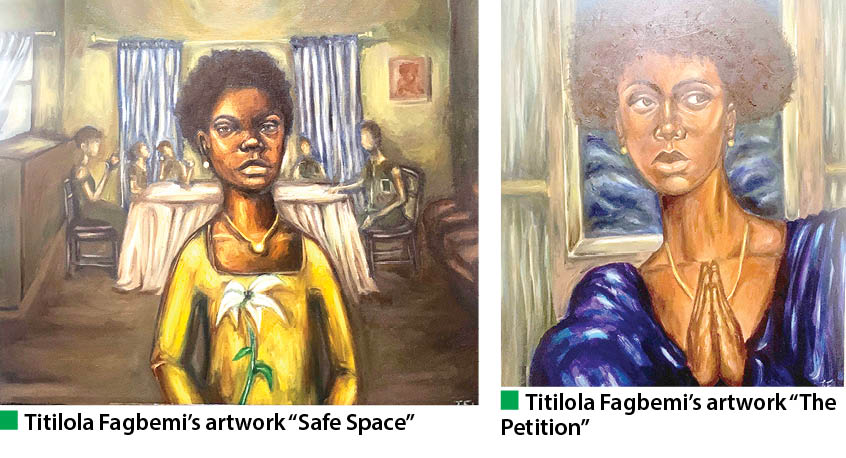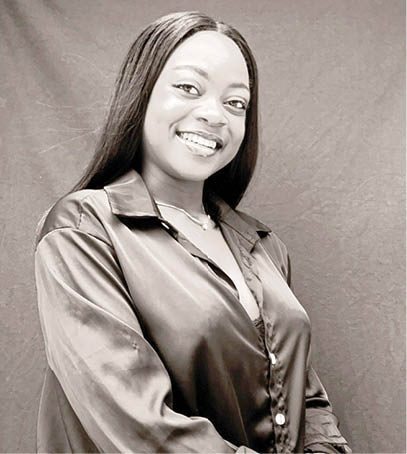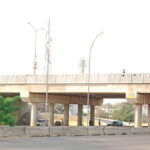Titilola Fagbemi is a Lagos-born artist who uses portraiture to express and communicate her emotions and personal experiences. In this interview with Daily Trust on Sunday, Titilola shares her journey in the art industry.
Of all professions, why did you choose to be an artist?
Well, I believe art is an essential part of our culture and society, and I want to contribute to its growth and development. It serves as a way to freeze time and document history. Being an artist allows me to communicate with others in a way that transcends words and creates a shared experience. It’s a way of making connections and building community through creativity. And honestly, I choose to be an artist because it allows me to fully realize my imaginative potential and bring my unique voice to the world. To me, art brings a certain level of freedom.
Care to share your background and how it has influenced your work
From as early as five, I have been drawn to creative activities and even have fond memories of my mother helping me with my art assignments. Also, my early exposure to artistic practice at my primary school ‘Centro Escolar’ played a significant role in shaping my interests. I was one of those kids always drawing fashion girls in every notebook. I went on to study Business Administration and art was still a hobby till I graduated in 2018. I decided to take it on alongside building a corporate career. You can call me a day time analyst and night time artist as I’m constantly embracing the duality. My background has instilled in me a sense of curiosity, empathy and appreciation for the beauty of the world.
Nigerian-American wins Dan David prize
700-year-old chair undergoes face lift for King Charles III’s coronation
What drives your creativity?
My creativity is driven by a combination of factors. Firstly, my environment plays a big role in inspiring my work – from the people I interact with to the places I visit, and the things I see around me. Secondly, my emotions and personal experiences also influence my creativity. I key into speaking on difficult themes people will rather shy away from and complexities of being human, whether it’s a feeling of introspection, frustration, or even grief. Everyday humanness is the canvas on which I weave my paintings. Finally, I am constantly seeking out new sources of inspiration through reading, attending exhibitions, or exploring different art forms. You will always catch me learning something on YouTube.

How do you go about starting a new project?
Starting a new project is always an exciting yet challenging process. I take some time to brainstorm and sketch out rough ideas and concepts. Then, I’ll do some research to explore and refine those ideas further. Once I have a clear direction, I’ll start experimenting and sketching out rough drafts. From there, it’s a matter of refining and working on the final piece. But ultimately, the key to starting any new project is just taking that first step and diving in.
What part does research play in the development of your ideas?
Research plays a critical role in the development of my ideas. Before starting any new project, I spend a considerable amount of time building mood and reference boards across the theme, potential colour palette, composition and art styles. Some of my favourite platforms are Pinterest and Bedance. I also try to find relevant examples of similar projects or artworks to gain inspiration and insights. Research helps me to ensure that my work is not only aesthetically pleasing but also informed by a solid conceptual framework.
Is there a certain environment or equipment that you need to complete your work?
Yes, I have a preference for natural light, a well-ventilated space to work, and good music. Having access to this is my holy grail to help start and complete a piece.
How can you tell if a project is complete?
It’s hard to say when a project is ever complete, because I’ve had paintings I leave for a year and come back to complete after. When I feel that the painting communicates my intention, then I know that the project is complete, and that’s when I drop the paintbrush.
How do you handle juggling several projects at once?
Oh, it can get crazy. Sometimes I feel like I’m juggling so many things all at once but it’s all about discipline and building a structured system for me. Building a system around strict schedules and timelines helps to keep me accountable, stay focused and organized.
How do you respond to criticism?
I’m always open to criticism; I acknowledge the critic’s opinion and take the time to understand their perspective. I would try to see if there is any truth to their critique and use it to grow as an artist. I remember during the 2021 Rele Young Contemporaries bootcamp, it was the first time I had other artists critique my work. It wasn’t easy sitting there while it was dissected, but it evidently made me see areas of improvement. However, I would also not let criticism define me or my work, and I would continue to create from my authentic voice. At the end of the day, I believe that art is subjective and everyone will have their own opinion, and it is important to stay true to oneself while also being open to constructive feedback.
How do you overcome blocks in your creativity?
I wish I had a secret recipe for overcoming creative blocks. But alas, I don’t. Sometime in 2020, I got comfortable with the concept of creating “bad art” – basically, art that I’m not head-over-heels for. When I hit an art block, it doesn’t mean I have to stop creating altogether I just can’t seem to make anything that’s up to my usual standard. But embracing the idea of creating despite the block, while also studying the works of other amazing artists, has helped me break out of it. Also, I take a break, do something else, and return to work later with fresh eyes. Other times, I simply accept the block and allow myself the grace to wait until the creative juices start flowing again.
Which of your past projects do you consider to be your favourites?
That’s a hard question because each project holds a special place in my heart and has its own unique story. However, I must say that my “State of Mind” series holds a special meaning to me. This body of work represents my journey, my growth, and my emotions over a particular period. The paintings were a reflection of my state of mind at different points. It was a therapeutic experience for me, and I felt like I was able to capture and express myself through my art and most especially heal. Art is my self-prescribed therapy.
What qualities do you believe define an excellent artist?
Excellence differs for different people. But I’ll say an excellent artist is someone who is talented and committed to their craft. One who has a strong work ethic, a willingness to take risks, and someone who can tell compelling stories through their work, whether it be through painting, sculpture or any other medium. Most importantly, it is someone who can stay true to their vision, while still being open to new ideas and perspectives.
What do you think the most difficult challenges for artists are?
I think the most difficult challenges for artists in Nigeria are limited access to funding and resources, a lack of adequate art institutions and training facilities across the country, and issues with infrastructure, such as the lack of proper studio spaces etc. These challenges can make it difficult for Nigerian artists to make and showcase their work to a wider audience, limiting their growth and opportunities. Despite these challenges, many Nigerian artists fight the tides and continue to create exceptional work.
What, in your opinion, distinguishes your work from that of other artists
My work reflects the unique nature of the human condition from a personal and communal perspective. Also, I think my approach to each project and a willingness to experiment with different styles and techniques sets me apart. For me, I’m particular about the story I’m telling. My recent body of works are linked to each other, you have one painting as the starting point and the last being one that ends the chapter. The paintings flow together, like you’re reading a book or like completing a puzzle.
What superpower would you wish to have and why?
Simple. The power of teleportation. It’s such a fun concept to shout abracadabra and you’re gone. And as an artist, in constant search of inspiration, being able to instantly transport myself to any location in the world would open up a world of possibilities. Plus, it would make travel and commute so much easier. With teleportation, I could be anywhere I want in the blink of an eye like the Tate Museum staring at Ophelia by Sir John Everett Millais.
What food, drink or song motivates you?
Not sure I have a food or drink that motivates me, but a song is the classic, Slow, Slow (Run) by Ayo.

 Join Daily Trust WhatsApp Community For Quick Access To News and Happenings Around You.
Join Daily Trust WhatsApp Community For Quick Access To News and Happenings Around You.

